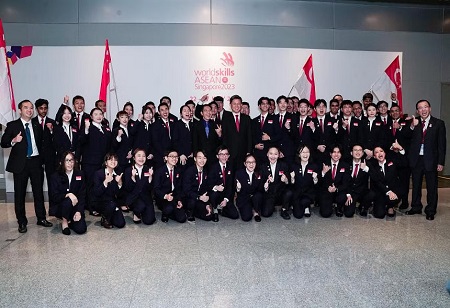-
Mr. Leonard Chia, 20, was beaming while he prepared a wide range of dishes and dinners over the span of three days, despite the challenges of working in a ‘new’ kitchen and the pressure that comes from being encircled by people. “I’m really happy because this is the first time Singapore is in the top three in the cooking category for WorldSkills Asean”, stated the Nanyang Polytechnic Diploma in Food and Beverage Business student. Mr. Chia won a gold medal for his culinary prowess in three different categories: finger foods, a dinner for a casual dining experience, and a fine dining experience that displayed a deconstruct black forest dessert. It represented one of eight victories Singapore had in the competition, which has been linked to the Youth Olympics of professions.
At the thirteenth running of WorldSkills Asean, over 170 youths from Asean participated in 22 skill categories throughout the course of three exhausting days of competition. The largest skills contest in the area was carried out for the first time by Singapore at the Suntec Singapore Convention and Exhibition Center. Singapore won 26 medals eight gold, four silver, eight bronze, and six medals for excellence, and was represented in all 22 divisions by 44 young people from higher education institutions. In terms of the total medal count among the nine participating ASEAN member states, which placed the Republic in the second spot. By 27 medals, featuring 14 golds, Indonesia seized the lead. Singapore was ranked first in the world in cosmetic therapy, culinary, graphic design technology, industrial control, mechatronics, information network cabling, and the Internet of Things. Fashion technology and mobile robots are some further categories. Singapore won 26 medals eight gold, four silver, eight bronze, and six medals for excellence, and was represented in all 22 divisions by 44 young people from higher education institutions. In terms of the total medal count among the nine participating ASEAN member states, which placed the Republic in the second spot. By 27 medals, featuring 14 golds, Indonesia seized the lead.
Singapore was ranked first in the world in cosmetic therapy, culinary, graphic design technology, industrial control, mechatronics, information network cabling, and the Internet of Things. Fashion technology and mobile robots are some further categories. The goal of WorldSkills Asean is to elevate youth skill levels and to promote the region's prospects for vocational education and training. Christine Huang Yan Xin, an 18-year-old student at ITE College East, was unable to complete the tasks assigned to her in the beauty treatment category on the initial day of the competition, and she wasn't expecting to win. She persisted nevertheless and 'went all out' on the remaining days. The gold medalist claimed, “I managed to turn it around in the end”. Education Minister Chan Chun Sing encouraged Asean nations to engage in lifetime skill development to be competitive in the international arena while attending the competition's prize-giving and closing ceremony. “Skills mastery is especially important in a future of work where the adoption of artificial intelligence and automation in the workplace is growing.
Addressing the global challenge of climate change and facilitating the green transition for our industries will also require new green skills”, Chan Chun Sing said. The people who took part faced a variety of obstacles that challenged their wits and resolve. To assess their versatility and ingenuity, contestants in the cooking category, for instance, got three days to prepare three-course dinners applying mystery items, including sea bass and prawns, that were provided that day. Competitors in robotics were asked to debug and finish various tasks that depended on a predetermined situation, including designing a robot to distribute and transport goods in a mock hospital environment. The activities grew increasingly difficult on the last day where they had to search for yellow cubes that represented waste materials and throw them away.
The Quick Transit Systems category, which was fresh to the competition, challenged competitors to detect and diagnose issues along with removing and afterward reassembling electric train components. Education and career advising expos by more than 70 industrial partners were organized in cooperation with WorldSkills by MOE and the institutions of higher education. Approximately 10,000 pupils from secondary schools were gathered. Students faced situations including failures in the rail system and had to physically drive the train back to a stop in a Thomson-East Coast Line train simulator at a booth put together by Singapore Polytechnic, the Land Transport Authority, and SMRT. In the display of the semiconductor giant Micron, students put on virtual reality goggles to experience an entire day in a wafer fab through engaging activities that had them ‘wearing’ safety gear like helmets and suits and moving equipment.
🍪 Do you like Cookies?
We use cookies to ensure you get the best experience on our website. Read more...

